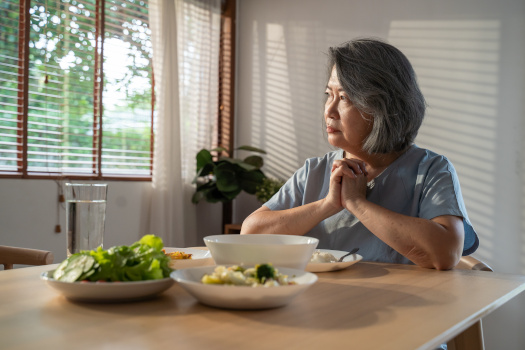As people age, they often experience a decrease in appetite. If this situation prevents seniors from getting their daily requirement of vitamins and minerals, it could lead to serious health conditions. Here are five reasons seniors avoid eating.
1. Dehydration
When seniors don’t drink enough water, their appetite may be affected, leaving them feeling weak and dizzy. They may also experience decreased urine output, constipation, and headaches. If you notice your senior loved one is exhibiting these symptoms, encourage him or her to drink eight glasses of water a day. To promote hydration, make sure your loved one always has a glass or bottle of water within reach. Providing easy access is a great way to minimize chances of dehydration.
If your loved one needs encouragement to drink plenty of water or focus on other elements of a healthy lifestyle, consider hiring a professional caregiver. Elderly home care agencies can be a great boon to seniors. With the help of the caregivers at Home Care Assistance, your aging loved one can lead a happier and healthier life. We offer a revolutionary program called the Balanced Care Method, which encourages seniors to eat nutritious foods, exercise and socialize regularly, and focus on other lifestyle factors that increase life expectancy.
2. Diminished Taste
Some seniors notice their ability to detect flavours diminishes with age. If your loved one starts finding his or her favourite foods bland and unappealing, try adding interesting new flavours to his or her meals. Consider using spices from other cultures. Your loved one may end up liking Indian cuisine or Thai food.
3. Chewing Difficulties
Diminished appetite can also be caused by difficulties with the eating process. If your loved one is having a difficult time chewing, swallowing, or using utensils, he or she is less likely to enjoy meals. For seniors who have a difficult time chewing and swallowing, caregivers can make nutrient-rich shakes or smoothies for breakfast. If your loved one is having difficulty with utensils, try serving finger foods. Chicken strips and carrot sticks are great options for seniors with motor coordination issues.
Living with serious health conditions can make it challenging for seniors to age in place. However, they can maintain a higher quality of life with the help of professional live-in care. Barrie seniors can benefit from assistance with meal prep, bathing, transportation to the doctor’s office, medication reminders, and much more.
4. Sensitivity
Seniors sometimes develop sensitivities to smells, tastes, and foods. Try to keep track of your loved one’s food preferences. If your parent develops an aversion to a certain smell or experiences stomachaches after eating a certain food, his or her diet should be adjusted.
Some of these sensitivities might be evidence of a health concern, which should be discussed with a doctor. If your loved one experiences abdominal bloating after eating bread, it may be a sign he or she has developed a gluten allergy. However, if your loved one has simply developed a distaste for a certain flavour, try to accommodate him or her. Seniors are more likely to eat if they enjoy their food.
5. Unbalanced Routines
Caregivers should try to establish daily meal routines. Eating meals at different times every day sends the body mixed signals, which can result in a loss of appetite. By instituting consistent mealtimes, you can coax your loved one into eating healthy meals. For seniors who are still resistant to eating, caregivers should focus on serving small portions of nutrient-dense foods. Nut butters, avocados, berries, and broccoli are excellent choices.
You can make sure your loved one eats healthy foods each day by hiring a professional caregiver to prepare nutritious meals. Maintaining a high quality of life can be challenging for some seniors, but professional caregivers can help them obtain this goal. Families can trust Barrie senior care experts to help their elderly loved ones focus on lifestyle choices that increase the chances of living a longer and healthier life. If you need professional home care for your loved one, Home Care Assistance is just a phone call away. Reach out to one of our Care Managers today at 647-970-3803.
